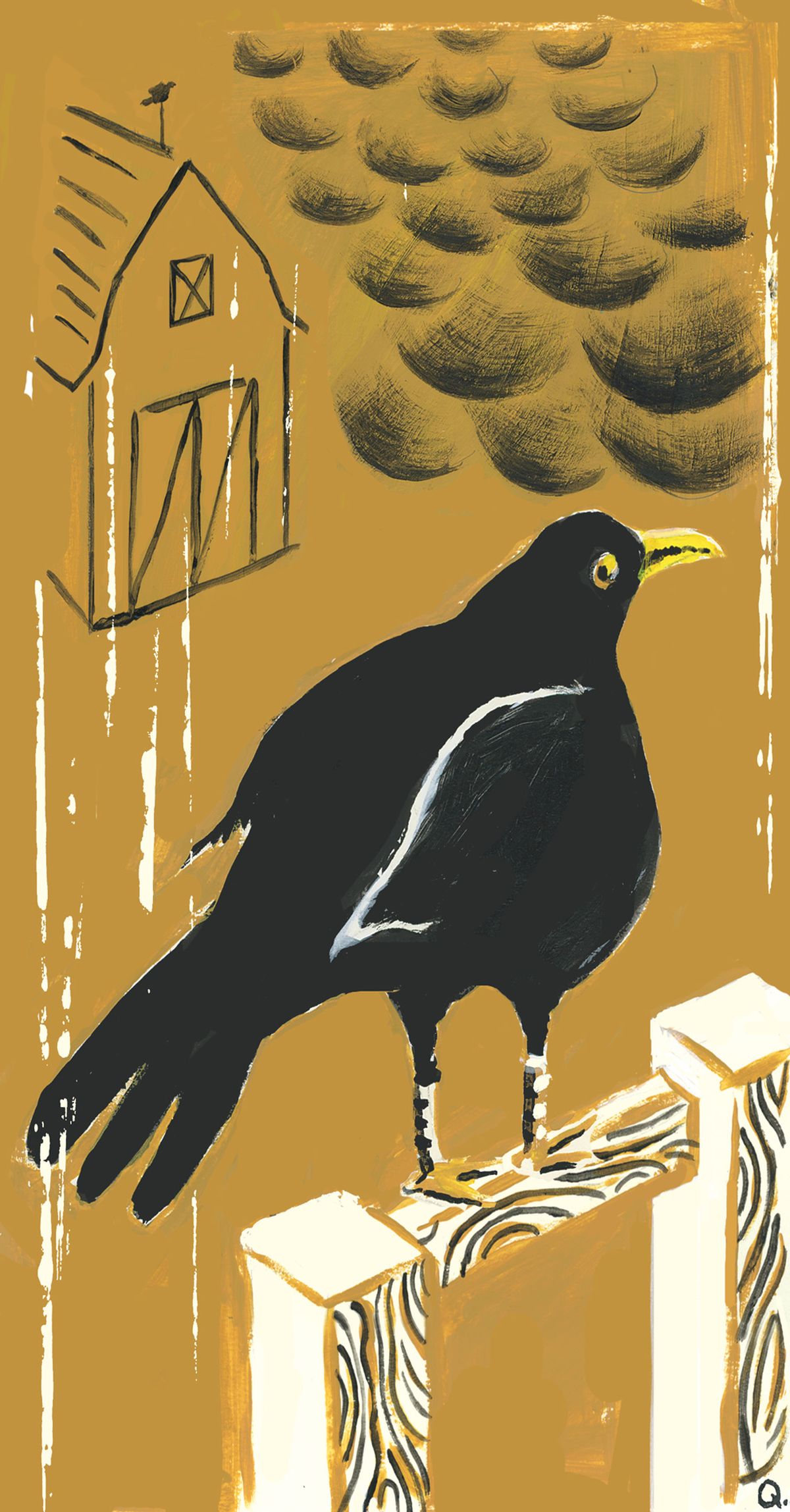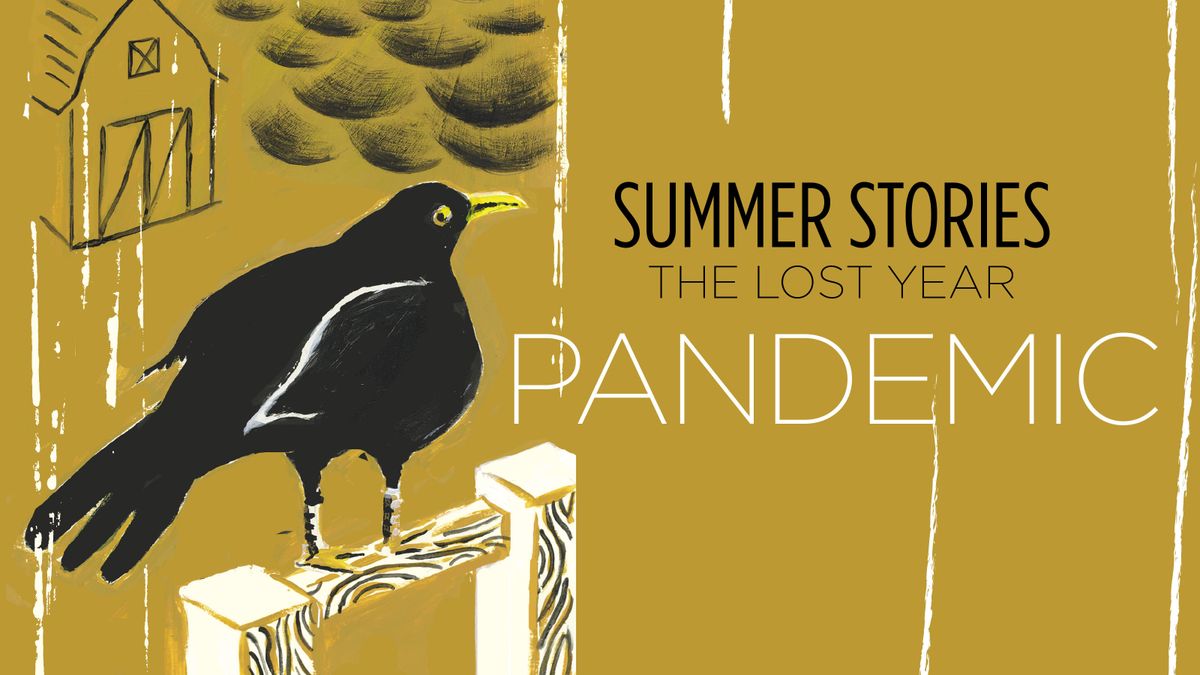Summer Stories: ‘Pandemic’ by Shann Ray
John watched a blackbird light on the window sill.
Feeling numb, he looked away and further berated himself.
“He’s so self-enclosed,” he overheard Samantha tell their oldest. “He doesn’t hear me.”
The children knew and didn’t know. They moved in his presence like worlds in orbit to the sun of Samantha, while he felt left to the outer dark.
“I love you,” she’d said continually. “I don’t want you to think this way.”
But no one could stop him. The thoughts were stubborn. Hopelessly, he wished he could go back and retrieve the money he’d lost in stocks and make himself good again.
Just before the kids came home, she’d taken a harder line, “You need to change if we’re to be together. You’re still young. Stop acting like you’re dead.”
She was no-nonsense. Loyal to a fault for three decades now, but she had to be tempted just the same, he thought, because he’d left the barn doors wide through winter. No hay or even the fragrant hint of hay. Good way to kill your horses.
Now she brought him to the bedroom alone, with all of them moving in the space beyond the bedroom door, talking and playing games, preparing and making meals, entering and returning, on horseback or by truck, from the wilderness. Out the window, the Front was a massive wall in the south. The sky was pure gold. She sat with him on the edge of the bed. He’d gotten that far and would gather himself for dinner. He tried to keep up appearances when the girls were present.
“Your shoes,” she said.
He left them unlaced.
“I don’t love you anymore,” she said. She hoped it might break him loose. A tear rolled from her left eye, and she wiped it away and pinched her eyes shut before opening them and staring into his face. The Montana weather had aged him, but not ungracefully, if hardened by his depression and the net of lines scoring the right side of his face.
He felt blank.
“I know,” he said. “I’ve made myself unlovable.”
“No, you have not, dammit,” she said.
“Is it someone else?” he said.
She shook her head no, but she knew where he went now despite both of them wishing he wouldn’t. He’d been telling himself they’d continue to perform their tacit separation in this bed, before these windows and this wilderness. He’d hoped she’d stay strong, but now he felt her body had displaced him.
“It’s Hank Thompson,” he said.
She was angry now, and cried angrily, though she tried to stop. His read was obtuse. She didn’t reach for his hand, and he was grateful she didn’t. He felt the slow build of hate in his frame as he kept his face unmoved. She wiped her tears with her sleeve.
“No,” she said, her face sealed. “There’s nothing there.”
Hank Thompson, he thought, former National Park forest ranger. Ten-year widower.
Five, maybe six years older than John. They’d had him over numerous times for dinner. Steak and blackened asparagus the last time, if John recalled correctly. They’d given him their best wine. Hair cut tight to his head like an old badger, but one that smiled too much. John’s chest felt a jolt. His face revealed nothing. He thought of himself as the virus.
“Say something,” she said.
He lifted his eyes and looked at her.
She slapped him, her hand the beat of a drum that brought him more awake.
She watched his eyes after, and he held her gaze. He was granite.
His scars, she noticed, grew inflamed from how she hit him.
She rose and left the room.
He watched her go before he rose, too, and pulled his father’s .357 Smith and Wesson revolver from his sweater drawer. He lifted his flannel shirt and placed the stock in his armpit so the barrel lined his upper ribs. He clutched the firearm to his side this way, concealing it as he walked through the living room, smiling at his wife at the kitchen table with their two daughters.
He walked out the front door, the men on the porch nodding and lifting their beers to him.
A steady gait took him to the barn half a football field south and through the barn doors, past the stalls where the horses sensed him and twitched, and the big roan glanced at him white-eyed with her ears back.
You know, he thought, don’t you.
He went out the far doors, turned the corner and sat down with his back to the west-facing wall. Green barn, white trim. He set his legs straight and leaned his head against the wood. He drew the weapon from under his shirt and didn’t look at it. Releasing the safety, he pressed the barrel to his face just under the cheekbone. He moved it, placing it under his jawbone, then up under the orbital bone. He touched the metal to his temple. Then the bridge of his nose.
He lowered the gun, resting it on his thigh.
The steel was heavy and cold.
He’d won her, he thought, those years ago. No, he thought, she’d won him. Maybe he was wrong. He didn’t think so. He’d defended their own children against racism like a grizzly.
But he couldn’t protect them entirely. They needed to face the furnace of America, she’d told him. Her Puerto Rican sensibility. His own Northern Cheyenne line he’d largely ignored. Great-Great-Grandmother Killsnight whose family he’d never truly traced. He’d learned some of Sand Creek, some of the end of the Indian Wars. He was sad and felt culpable. He knew his Czech and German grandparents. He knew their line more fully – the Lidice Massacre like a knife wound, always seeping if he dwelled on the specifics. Reinhardt Heydrich. The Butcher of Prague. The 82 children sent to Chelmno and gassed to death in Magirus vans known as dushegubka in Russian, taking the feminine etymological form, or literally, soul killers. The Aryan-looking children Germanized, sent to Lebensborn orphanages by the Central Race and Settlement Branch officials, or ingested into German SS families. The women were concentrated, left for dead.
He was racist himself, he thought, favoring the White suffering he knew over the Cheyenne suffering he didn’t. He thought of Samantha, of their lives in the first years, skin to skin. Of how she’d tried hard, recently, to move him. He thought of her being false, disloyal now after everything. He couldn’t bring himself to hate her. He hated himself.
Far below, where the road bordered the great field and met the river, he saw a long black cloud of movement. He reckoned it a flock of yellow-headed blackbirds and starlings at play between the land and sky, a few redwings mixed in. Up close, the cacophony would be deafening.
From a distance, the flow was simply a movement that called to him as if flight were his home and earth only a memory.
He pressed the gun barrel to his eye again, chalking up against himself, his hands disjointed from rodeo and ranch work, the tuft of hair on his head, the lank bangs long for cutting, the stink of his armpits, his odors, his disheveled appearance and hooded eyes.
His parents would be disappointed to see him this way, but they were long passed now.
Samantha had hung in there all she could. Increasingly, she’d said he needed to change. But he didn’t listen. Admittedly, he’d coveted this moment for so long, and now that it was here, he was at peace. He could finally allow his anger, and how below was the overwhelming desire to be free of pain.
He wouldn’t be his grandfather.
He’d be himself, in the same place behind the barn but not with a rifle.
The handle of the revolver felt light in his hand now compared to the density of his bones. His age and bearing and lethargy. She’d mentioned it of the nation and of him, but it was concrete now; he couldn’t alter his self-absorption. Yes, he thought, I’m angry. The clearheadedness surprised him. So angry with himself and God, America and Samantha. It was a victory to say so. He touched the metal to his lips once before he placed the barrel in his mouth, closed his lips over the curvature and closed his eyes.
He had to breathe heavily through the discomfort. He cocked the hammer, his hands more steady than he imagined they’d be. He was not bright but dull, he thought. Not just himself, but all his family’s men, those who came before and those yet to come. He didn’t know himself. A voice kept saying, kill yourself. Do it now. He inverted his hand, placing his thumb on the trigger, breathing out and in one more time through his nose. When he pressed his thumb slightly into the metal, he heard grass rustle from around the corner and a child’s voice singing.
Gabriella, the light-haired one. He opened his eyes, uncocked the hammer and set the gun behind him just as she rounded the corner and came bounding toward him. Young and not afraid. Singing a made-up tune about the clouds, she leapt into his arms. He held her as if holding his own life, carefully, closely, and with all the tenderness he could bear.
“I’m singing at the clouds!” she said. “Do you love my song?”
“I do,” he said. “Very much.”
“Is that why you’re crying?” she asked him.
“Yes, Gabriella,” he said.
Her name made him shudder.
“Good tears,” she said, “happy tears.”
She wiped his cheeks with her hands and kissed his head.
“Happy tears,” he echoed and held her close, her frame so light in his arms.
A cousin shouted her name, and she laughed and ran away.
Her name was Gabriella Blue. She wanted everyone to call her Gabriella. “Not Gabby. And not Blue.” She smiled as she corrected people. His oldest daughter’s child.
She ran like a young deer into the lower field.
When she disappeared over a grassy lip, he shook his head, wiped his eyes and stood. He lifted the revolver from the grass, set the safety and placed it under his belt above the right front pocket of his jeans. His shirt covered it. He saddled the roan he called Amber for how the horse’s sheen came full in certain light and rode the 10 minutes down to the river. The water was smooth and deep even in late summer. Clarity in it like glass. He stood next to his horse and threw the revolver far into the river, the effort making his shoulder socket ring with pain. He rode back to the barn, unsaddled Amber, and patting her down spoke kindly to her. He put his face to the animal’s forehead. Pressing his cheek to Amber’s cheek, he smelled wheat in the horse’s coat. The horse breathed calmly and looked on him with a pleasant eye.
Returning to the house, his chest felt less heavy. He drew a glass of water from the kitchen faucet and one for Samantha and sat next to her as she sat with their daughters. The window was partially open, a breeze lifting the leaves of aspen in the yard. He placed his hand on hers, and she moved her fingers into his, the curve of their hands something he recognized. He didn’t know if they could regain each other.
Outside, the blackbirds along the river flew in vast configurations.
He heard the quiet radiance of their sound register beyond the window.


